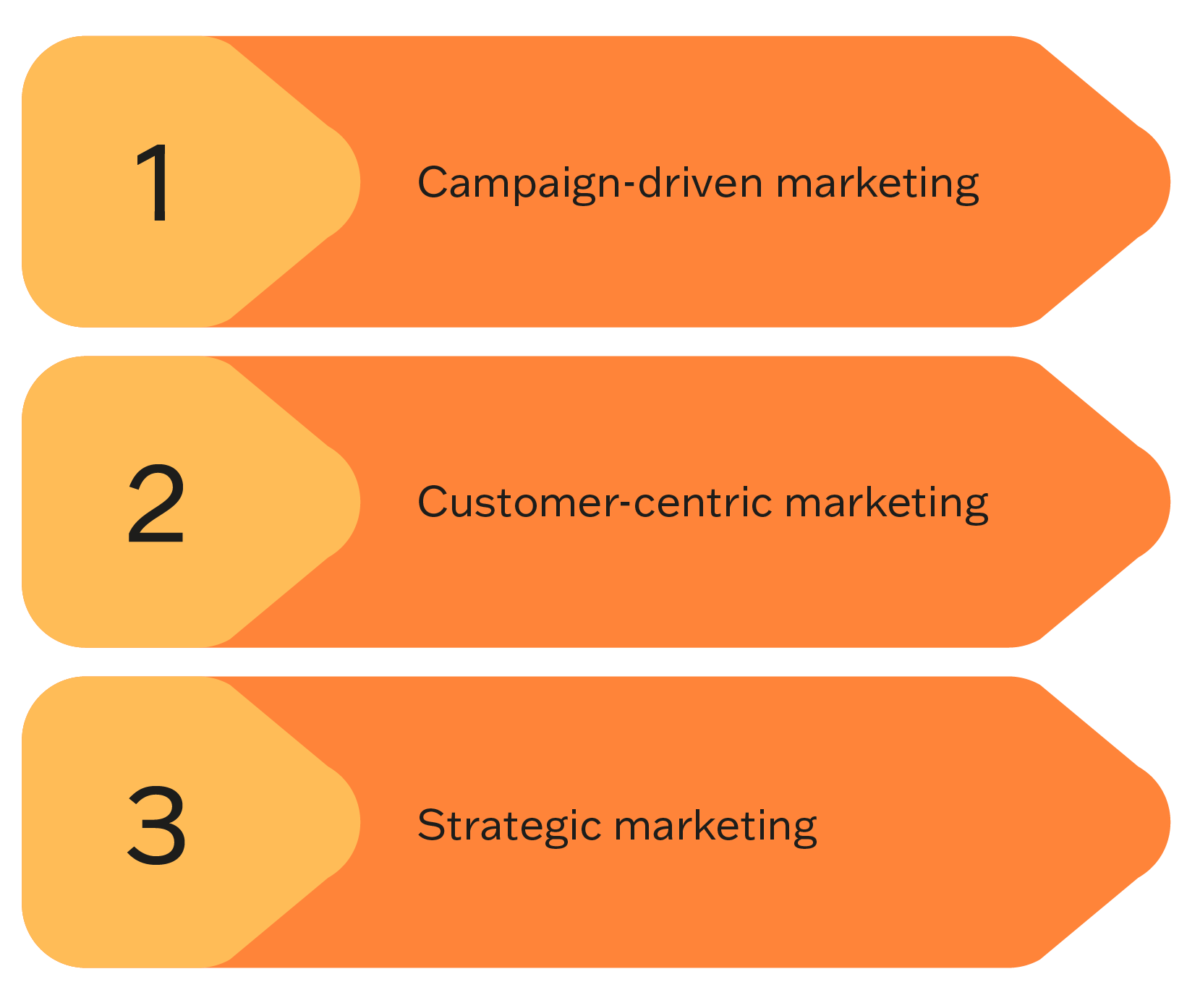
Profitable growth with marketing
Marketing toolkit is filled with all kinds of tools, but which tools should be used and for what purposes? How should marketing be developed in order to support the entire company’s growth and to produce even more satisfied customers?
One way of looking at marketing is to divide it into three stages of maturity.
Third level is what we call strategic marketing.
Campaign-driven marketing
Marketing is conducted through campaign-driven efforts. Sales and marketing do collaborate a bit. Marketing automation is exploited in a few simple ways, such as sending out newsletters and managing leads. Monitoring focuses on short-term operational metrics, typically the number of leads.
Customer-centric marketing
Marketing is carried out with a customer-centric approach. Sales and marketing plan and execute automated actions together for various stages of the customer lifecycle. Together they utilize enriched target groups and behavior-based segmentation. The productivity of these actions is continuously measured and optimized.
Strategic marketing
Marketing is an inseparable part of all customer communication and client work. Everyone involved in client work collaborates seamlessly to create stellar customer experiences. Marketing is administered in a personalized, omnichannel, and scalable manner throughout the entire customer lifecycle. Customer communication is optimized for various customer personas. The focus lies in the value of the customer lifecycle and in generating long-term value.

Marketing automation
Always busy? Desk piling up? Automation can significantly improve your work efficiency.
An almost endless array of tools can be found in the marketing toolkit, ranging from blogs to videos and from events to customer stories. The possibilities are nearly limitless, yet the resources are limited.
In solving this tricky equation, marketing automation plays a significant role.
Marketing automation is an effective way to automate repetitive routines, manage customer communication on a personalized level, and categorize leads without any manual labor. In essence, it significantly amps up the efficiency of marketing.
Generate growth with
strategic marketing
Do you want to achieve better results with marketing, benefit from technology and automation and demonstrate the results of marketing activities in euros?
We can help you achieve even better results.
Account Engagement (ent. Pardot)
We’re here to get you started with Salesforce’s Marketing Cloud Account Engagement, a powerhouse toolkit for marketing automation, as well as efficient handling and nurturing of leads. Account Engagement shines particularly for businesses engaged in B2B sales – it thrives in the complexity of sales processes where cycles are prolonged, and the decision-making involves multiple stakeholders on the client’s side.
Marketing Cloud
Marketing Cloud is a comprehensive digital marketing solution that enables the depiction and construction of buyer journeys as well as approaching customers with personalized messages at the right time and in the right channel. Marketing Cloud is often the choice of B2C companies, as it fits particularly well into scenarios where a company has a large number of customers.
Data Cloud
Data Cloud is Salesforce’s customer data platform, otherwise known as a Customer Data Platform (CDP), which allows for the unification of customer data collected from numerous sources, the real-time utilization of data, and the creation of unified customer profiles based on all available data. Data Cloud is the solution when the goal is to deliver superior and personalized customer experiences.
The most typical challenges of marketing
It's difficult to show the results of marketing activities.
In data-driven marketing, the impact of all actions can be observed throughout the entire customer journey, from leads all the way to closed deals.
Marketing has become fragmented.
Managing marketing as a whole can be tough when marketing is expected to juggle so many different balls at once. We’re here to help you focus on what truly matters.
Marketing and other functions aren't aligned and aren't working together.
Customer work is still being done far too much in siloes. Bringing all customer work onto the same platform and sharing access to the same customer data can help take big leaps towards seamless collaboration.
Frequently asked questions
Salesforce was initially developed for sales, but it has since evolved into a technology platform capable of running all business operations from sales and marketing to customer service. Salesforce’s Marketing Cloud is a marketing tool designed to nurture customer relationships, build brand identity, and deliver personalized messages to clients. On the other hand, Account Engagement serves as a tool for identifying website visitors as well as generating and nurturing leads.
Absolutely. Using Salesforce as a common platform for sales and marketing brings significant synergy benefits, as both sales and marketing then have access to the same information. Meanwhile, the use of a common platform saves time, as there is no need to enter the same data into different systems or transfer it from one system to another.
Contact us
Our seasoned marketing experts can help you with anything related to strategic marketing, data-driven marketing, MarTech or marketing automation.